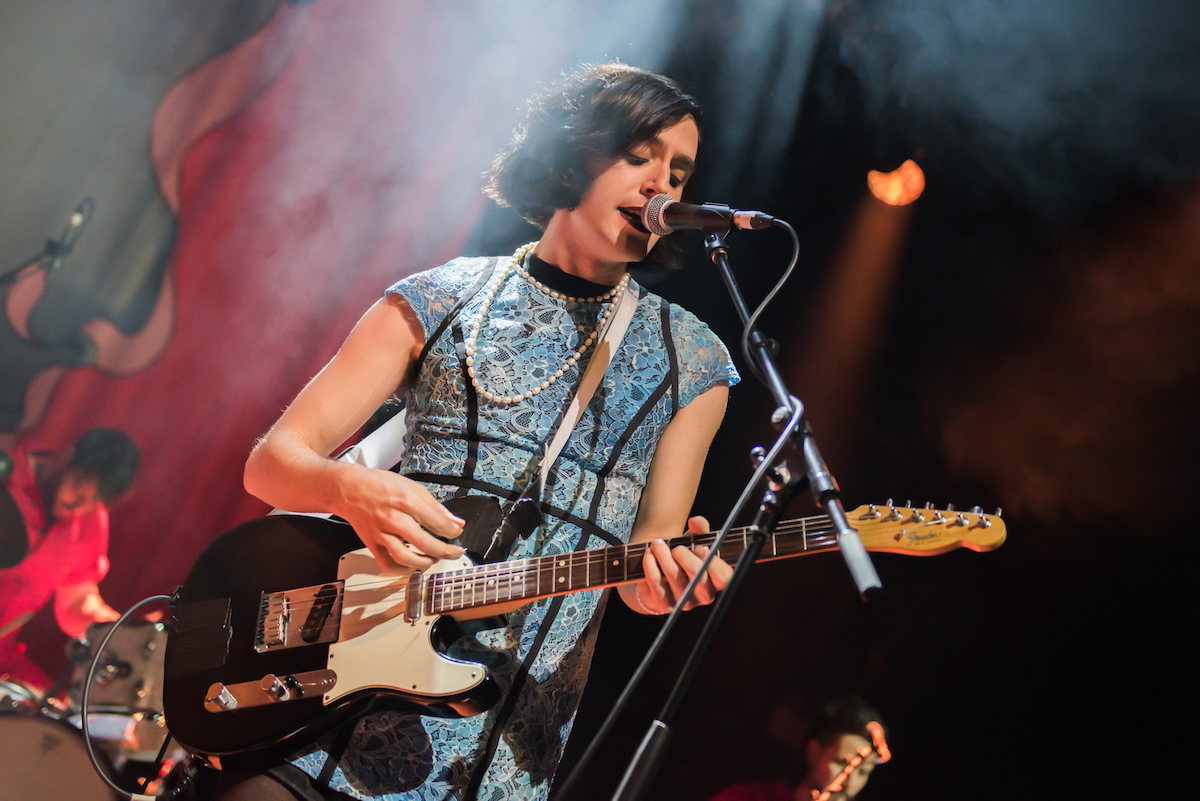Way, way back in the faraway time known as February, six of my friends and I crammed into our friend Bella’s old Volvo (three of us sitting in the back seat with one draped across our laps) and made the trek from our college in Northampton, MA to Somerville to see Ezra Furman in concert. The entire two-hour drive, we played a curated selection of our favorite songs of hers and hypothesized about which ones would fill the concert we were about to attend. We sang our way down I-90, the die-hard fans in the car shouting requests over the constant conversation and recent Furman inductees remarking on which ones they liked best.
You might know Ezra Furman as the musician behind the popular Netflix show Sex Education. Her songs make up most of the show’s soundtrack (available on Spotify!) and she’s featured in the band performing at the dance that ends the first season of the show. Furman has had a career long before Sex Education, though, and began releasing albums with her band The Harpoons in 2007. Since that first release, Furman has created eight albums (both with The Harpoons and on her own) and embarked on countless tours.
Her extensive discography has a little of everything — upbeat indie-pop jams perfect to bike around to and feel like you’re in a coming of age movie (see “Wobbly” and “Restless Year”), songs about first love (“I Lost My Innocence,” my personal favorite), self love (“Body Was Made), queer love (“I Wanna Be Your Girlfriend”), lost love (“Wild Rosemarie”), punk songs that should/will be on the soundtrack to the revolution (“What Can You Do. But Rock ‘n’ Roll”) and ballads to sing around a campfire (“One Day I Will Sin No More”). What they share in common is Furman’s unique ability to beautifully articulate the human experience in this crazy world that we inhabit.
While it is always special to see an artist whose work you admire in concert, the show my friends and I attended in Somerville was truly magnificent — but also quite revelatory. Something powerful about Furman’s work is that it’s deeply personal but also meets every person who listens to it exactly where they’re at. A listener can get messages of hope, despair, love, and brokenhearted-ness all from the same song depending on where they are emotionally while they’re listening, and getting to sit on a tackily-patterned carpet just feet away from Furman performing the songs that have guided me through all of those feelings was really special.
Not only is Ezra Furman an incredible lyricist and performer, she’s also a Jewess. As she stepped on stage to start her first song, I noticed four sets of tzitzit hanging below the hem of her dress. Seeing her wearing them made me realize that I had never seen tzitzit worn under a dress before, especially not by someone who is the center of attention in a non-religious space. Seeing Furman, a queer trans person, reclaiming something that is traditionally reserved for men while being unabashedly Jewish in front of a largely non-Jewish crowd made me think of all of the ways that I have reclaimed my own Jewish identity since coming to college.
Before I left for school, I had to answer a million questions from relatives asking me about how I would “stay Jewish” at a historically pretty WASP-y school. I had no answers then, as my Jewish life until that point had mostly been based on being dragged to synagogue by my parents, but this past year I began to figure it out.
The most meaningful part of Judaism to me has always been the emphasis on community — eating with loved ones, praying with friends, celebrating the milestones of those around you. This year, I found that community in my incredible group of friends, both Jewish and not, at school. Every time talk we about what religion means to us, celebrate holidays together, and, during potluck Shabbat dinners (made from stolen dining hall vegetables), eat the challah that we braid together in an idyllic greenhouse, I feel so lucky to have something so special. These people make me feel whole. Just like Furman and her tzitzit, we have found ways to take aspects of Judaism and turn them into our own queer, vibrant, and communal traditions.
And now that we can’t be together in person, these are the memories that I hold close when thinking about life post-coronavirus. They remind me of the potential for magic that exists when tasked with building a new world.
At the end of the concert, Furman put down her guitar and talked about a Biblical idea that was on her mind. She talked about how Judaism teaches that people were made in the image of God, and that the way to get closer to divine power is to be vulnerable and full of love for the people around you. As I listened to her talk and looked at the faces of my friends who I knew I was about to spend two more hours squished into a car with — and who have helped me feel more in touch with Judaism than I ever anticipated — I felt every word of what she was saying reverberate through me and knew that these bonds, too, contain a divine spark.
Header Image: Ezra Furman performs on November 14, 2019, photo by Robin Little/Redferns/Getty Images.



